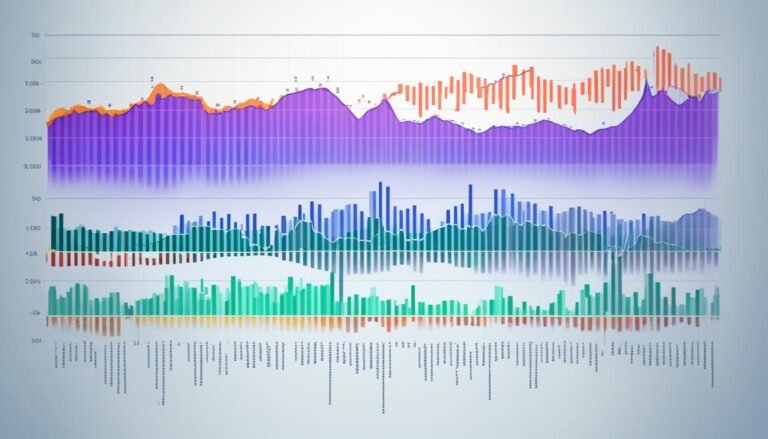Cryptocurrency Accounting: Best Practices and Standards
The global market cap for cryptocurrencies has now passed $2 trillion. This shows how important digital assets have become. But managing and reporting these online currencies require great care.
We’ll look at how traditional financial ideas are key in the new world of digital currencies. We’ll see why using the best methods in crypto accounting is crucial. This article helps connect the dots between new digital money and old financial rules. This way, businesses can step into this new world with confidence.
Key Takeaways
- The global cryptocurrency market cap exceeds $2 trillion, highlighting the importance of robust accounting practices.
- Adopting best practices in crypto accounting is essential for effective and reliable digital asset management.
- Understanding the intersection of traditional financial principles and cryptocurrencies ensures accurate financial reporting.
- Establishing standards in digital asset management facilitates better compliance and transparency.
- Navigating the new digital landscape requires a blend of established financial expertise and innovative approaches.
Introduction to Cryptocurrency Accounting
Understanding cryptocurrency accounting is key in today’s fast-changing crypto financial landscape. Blockchain and digital currencies are growing. So, we must have solid and reliable accounting methods. This sets the base for more detailed cryptocurrency accounting learning.
Cryptocurrencies change in value a lot. This makes traditional accounting hard to use. Each coin, token, and blockchain is unique. So, we need special ways to value and report them. Knowing this helps create effective accounting methods.
Dealing with digital money’s decentralized and private nature is tricky. Keeping clear records is vital, from tracking addresses to matching trades. Everything must be recorded carefully. Special tools and skills are needed for this.
Having strong inside checks is a must in the crypto world. These checks prevent fraud and ensure financial data’s truth. They also help manage digital assets better. As more people enter the crypto market, these controls become even more important.
Using the same reporting ways is also very important. It helps us compare data from different places. And, it makes sure everyone follows the same rules. In the crypto world, this kind of reporting is key for being open and trustworthy. It also meets legal needs.
Essential Best Practices in Crypto Bookkeeping
When dealing with crypto bookkeeping, it’s critical to follow top methods to keep your financial dealings clear and honest. We’ll look at the main points of good crypto bookkeeping.
Maintaining Accurate Transaction Records
Getting crypto bookkeeping right starts with accurate crypto transaction records. It’s about recording all transactions, from buying and selling to getting and sending.
- Make sure to note key details like the date, time, amounts, and who’s involved in every transaction.
- Use special tools to check on your transactions. This can include blockchain explorers and software for watching transactions.
- It’s smart to keep a digital and paper record of your transactions for extra safety and to meet requirements.
Implementing Internal Controls
Having strong internal controls helps keep your financial data trustworthy and correct.
- Assign tasks wisely to stop fraud and mistake.
- Audit your records often to fix any mistakes or differences.
- Protect your assets and information with technology like multi-signature wallets and encryption.
Adopting Standardized Reporting Formats
Using standardized reporting is key for making financial statements that anyone can understand. This is crucial for both those inside and outside your business.
| Aspect | Details |
|---|---|
| Financial Statements | Put together balance sheets, income statements, and cash flow statements with set formats. |
| Compliance | Make sure your reports follow the right rules and laws for your area. |
| Transparency | Always explain your financial data and transactions in full. |
By sticking to these crypto bookkeeping best practices, you’ll have a clear and organized record. This leads to trust and understanding among everyone involved.
The Importance of Compliance in Virtual Currency Transactions
Virtual currency compliance is crucial in today’s fast-changing cryptocurrency world. It’s vital to follow the rules to avoid legal problems. Doing so also builds investor trust.
The rules about digital assets are hard to follow due to different laws worldwide. Knowing what’s required is key to staying out of trouble and staying on track.
Understanding Regulatory Requirements
Virtual currency deals follow various laws in different places. Keeping up with these local and global laws is a must. Groups like the FATF give advice to help companies comply everywhere.
Ensuring Transparent Reporting
Transparent crypto reporting is key in sticking to the law. It means clearly writing down and sharing all crypto transactions. This practice fights fraud and makes the market more reliable.
- Accurate Record-Keeping: All deals must be carefully logged and easy to trace.
- Regular Audits: Checking systems from time to time can fix issues fast.
- Adopt Reliable Software: Good crypto software that manages rule-following tasks can be a big help.
Keeping to these points makes following virtual currency rules easier. By focusing on clear record-keeping and regulation understanding, companies can do well in the crypto world.
Tools and Software for Effective Crypto Accounting
Good crypto accounting needs the right tools to be accurate. Using the best crypto software helps keep clear records and track transactions well. Including blockchain auditing tools boosts security and makes things more transparent. We’ll look at the top solutions out there.
Top Crypto Accounting Software Options
There’s always new and better crypto accounting software coming up. Below are some top choices:
- QuickBooks Online: QuickBooks is well-known for its detailed accounting features. It now supports crypto transactions, a feature loved by small businesses and folks who invest alone.
- CoinTracking: CoinTracking focuses solely on crypto. It tracks portfolios, handles taxes, and shows real-time market updates.
- Xero: Xero works smoothly with crypto apps. It offers powerful accounting for crypto and digital assets.
Integrating Blockchain Auditing Tools
Keeping digital transactions safe and accurate is critical. By using blockchain audit tools, you can boost transparency and trust big time. They use blockchain’s clear, unchangeable records to offer detailed audits.
Here are some top blockchain audit tools:
- Auditchain: Auditchain is all about real-time, decentralized auditing. It uses blockchain for live financial and operational updates.
- CertiK: CertiK focuses on making sure digital assets and smart contracts are secure. It uses AI and blockchain for thorough audits.
- Chainalysis: Chainalysis provides tools for checking compliance, investigating, and monitoring transactions. It aims to safeguard businesses from fraud and financial crimes.
By using crypto accounting software and blockchain audit tools together, companies can have accurate finance records. This helps with meeting rules and keeping things secure in the digital money world.
Navigating Digital Asset Taxation
Understanding digital asset taxation can be tricky because rules change fast. Cryptocurrencies like Bitcoin and Ethereum are getting more popular. So, tax officials worldwide are paying close attention to them.
It’s key for everyone, including businesses, to know about taxes on crypto deals. This means understanding when different tax rules kick in and the details of who owes what can vary by place.
| Region | Tax Treatment | Reporting Requirements |
|---|---|---|
| United States | Capital gains tax on profits; Income tax on earnings from mining or staking | All cryptocurrency transactions must be reported |
| European Union | Varies by member state; Usually involves capital gains tax | How to report may change, but usually, transactions are listed |
| Canada | Capital gains tax; Income tax on earnings | Every cryptocurrency deal must be fully reported |
Being clear about cryptocurrency tax liability is vital for following the law. Not paying taxes properly can lead to big fines. Zkeeping detailed records of crypto buys and sells is smart. Also, talking to a digital tax expert is a good idea. This helps avoid trouble and makes working with tax officials easier.
To summarize, understanding your country’s crypto tax rules, keeping good records, and getting expert advice when you need it is crucial.
Blockchain Financial Reporting Best Practices
Today, blockchain technology is key for clear and trusted financial info. It shows us how real-time reporting and auditing with crypto change the game.
Utilizing Distributed Ledger Technology
Distributed ledger technology (DLT) powers blockchain’s financial clarity. It creates a shared database handled by many. This boosts data accuracy. It helps cut errors and fraud risks, and improves working together. Every deal is securely noted, bringing unmatched openness.
Real-Time Reporting and Auditing
Blockchain lets us check finances instantly. This is game-changing for keeping track and making quick decisions. With real-time checks, staying compliant is easier, and issues are tackled fast.
By using these advanced methods, financial records are clearer and more trustworthy. Businesses can run with more confidence and accuracy.
Valuing Digital Assets Accurately
In today’s world, digital assets like crypto are becoming very important. They need to be valued correctly for clear financial reports. When it comes to finding the right value, market-based methods are often the best. But, figuring out the value of assets that aren’t traded much can be tricky.
Market-Based Valuation Techniques
To value something, we look at its current market price. This is easy for assets that trade a lot, like Bitcoin and Ethereum. For them, we use information from recent trades, the prices people are willing to pay, and the average price based on how much is usually bought or sold.
This way, we get a good idea of what the asset is really worth based on what people are doing in the market.
Challenges in Valuing Illiquid Assets
Valuing things that are not often traded is hard. This is because there isn’t much information to base our value on. Figuring out their true worth is not straightforward. The main problems faced are:
- Sparse Transaction Data: It’s hard to know the market price without much historical buying and selling.
- Price Volatility: Things that aren’t traded much can change in price a lot, making it tough to value them.
- Lack of Market Consensus: Since there’s no agreement about their value, different people might think they’re worth different amounts.
To solve these issues, other valuation methods might be used. For example, looking at how much money the asset might make in the future or getting opinions from experts. These can help get a better estimate of an asset’s value.
| Valuation Method | Advantages | Challenges |
|---|---|---|
| Market-Based Valuation | Reflects current market conditions; Data-driven | Not suitable for illiquid assets; Requires abundant market data |
| Discounted Cash Flow Analysis | Considers future revenue potential; Useful for illiquid assets | Assumptions can vary; More complex calculations |
| Expert Opinion | Leverages specialized knowledge; Useful in absence of data | Potentially subjective; Costly to obtain |
Crypto Tax Planning Strategies
Good crypto tax planning is vital for anyone looking to make the most of their money. It’s about knowing how to pay less while still following the rules. This way, you can use your understanding to your benefit when dealing with taxes on your crypto.
Minimizing Tax Liabilities
Reducing how much tax you owe is key for your crypto profits. Here are a few ways to do it:
- Use tax loss harvesting to balance out any gains you need to pay tax on
- Hold your crypto for over a year to get lower tax rates
- Pick the best accounting method for your investments, like FIFO or LIFO, to help with tax planning
Keeping good records and knowing the tax laws well also help cut down on tax costs. It’s about staying compliant but paying less where you legally can.
Maximizing Tax Benefits of Investments
Getting the best tax benefits is the other side of the coin. There are several ways to get more from your tax planning:
- Use accounts that offer tax breaks, such as self-directed IRAs, to delay taxes
- Give appreciated crypto to charities to get a nice tax deduction
- Track your investment expenses well to make filing taxes easier and more accurate
| Strategy | Purpose | Benefit |
|---|---|---|
| Tax Loss Harvesting | Offset taxable gains | Reduce tax liabilities |
| Long-Term Holding | Gain long-term capital gains rates | Lower tax rates |
| Donation to Charities | Full market value deduction | Maximize tax benefits |
| Tax-Advantaged Accounts | Deferred tax growth | Enhanced investment power |
Cryptocurrency Accounting: Best Practices and Standards
Cryptocurrency accounting’s basics are crucial. It highlights the need to follow the best methods and standards. Strategic accounting for crypto is key to handle the various aspects of digital assets. It aids in being accurate and compliant.
Standardized crypto financial procedures help avoid errors in accounting. They also keep financial records clear always.
Cryptocurrencies are known for their changing values. Thus, it is essential to have set financial practices for crypto. This helps businesses deal with price changes without losing transparency. With strategic accounting, companies can lower risks and improve their financial work. Below are the main points to remember:
- Accuracy in Transaction Records: It’s about keeping detailed and exact transaction records.
- Implementing Internal Controls: This involves creating systems to check and prevent mistakes and fraud.
- Standardized Reporting: Using the same methods for financial reports.
- Compliance with Regulations: Companies must understand and follow the rules.
By following these guidelines, handling cryptocurrency accounting becomes more doable. It also prepares companies for steady growth. Using strategic crypto accounting and financial rules brings big benefits. It strengthens the trust and accuracy of financial processes involving crypto.
| Best Practice | Benefit |
|---|---|
| Accurate Transaction Records | Ensures data integrity |
| Internal Controls | Prevents fraud |
| Standardized Reporting | Enhances clarity |
| Regulatory Compliance | Maintains legal standing |
By sticking to these principles, companies can confidently deal with the cryptocurrency world. It helps build trust and dependability in their financial processes.
Conclusion
As we close our talk on cryptocurrency accounting, it’s good to look at the main points. We see that keeping accurate records, having strong controls, and using standard reports are key. These steps help meet rules and make cryptocurrency deals clear.
Good management of digital money needs right tools. This includes the best accounting software and blockchain audit tools. Also, putting a correct value on your digital money is crucial. This can be done by looking at the market or finding value when assets are hard to sell.
Tax plans are very important for saving money and getting the most from your investments. It’s key to always learn and be ready for changes. Keeping up with new rules and good ways to do things is a must as the cryptocurrency world gets bigger. Being ready and smart with your money is how to stay in control.








